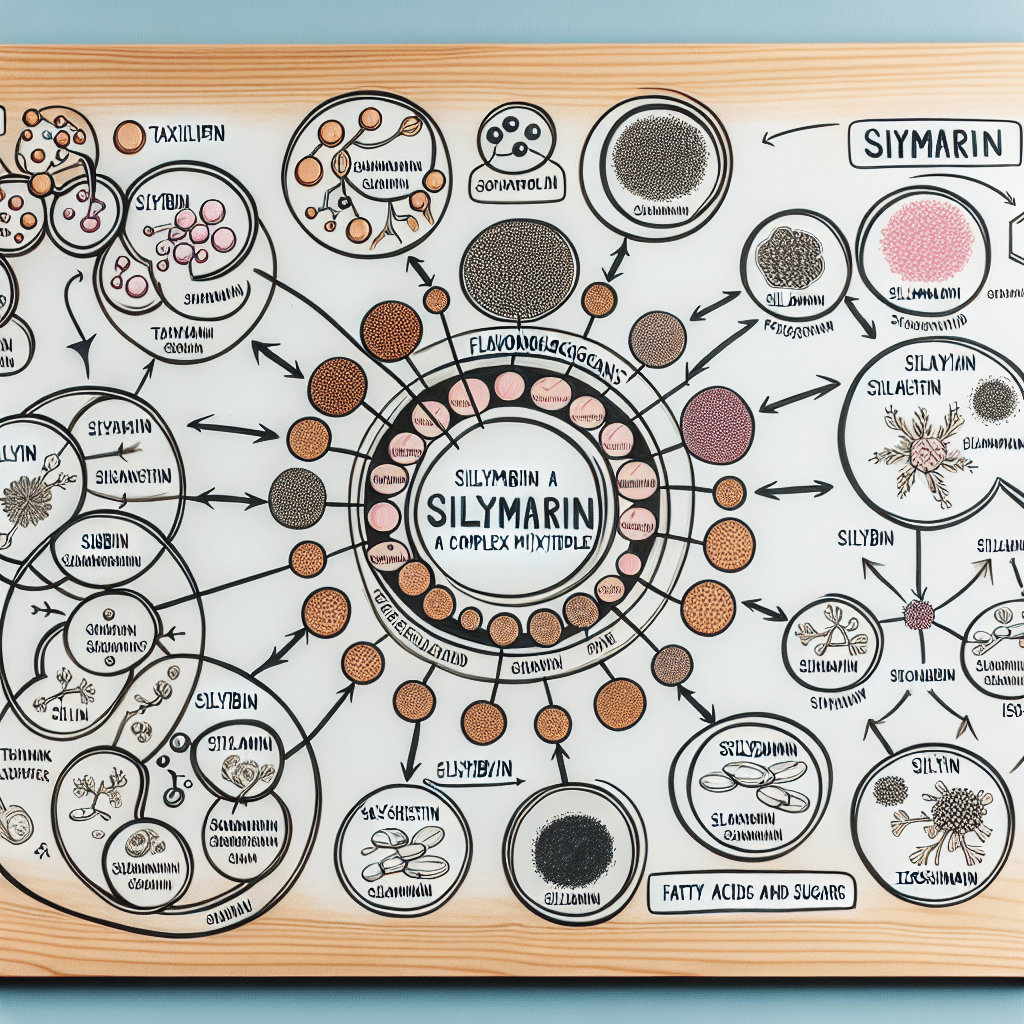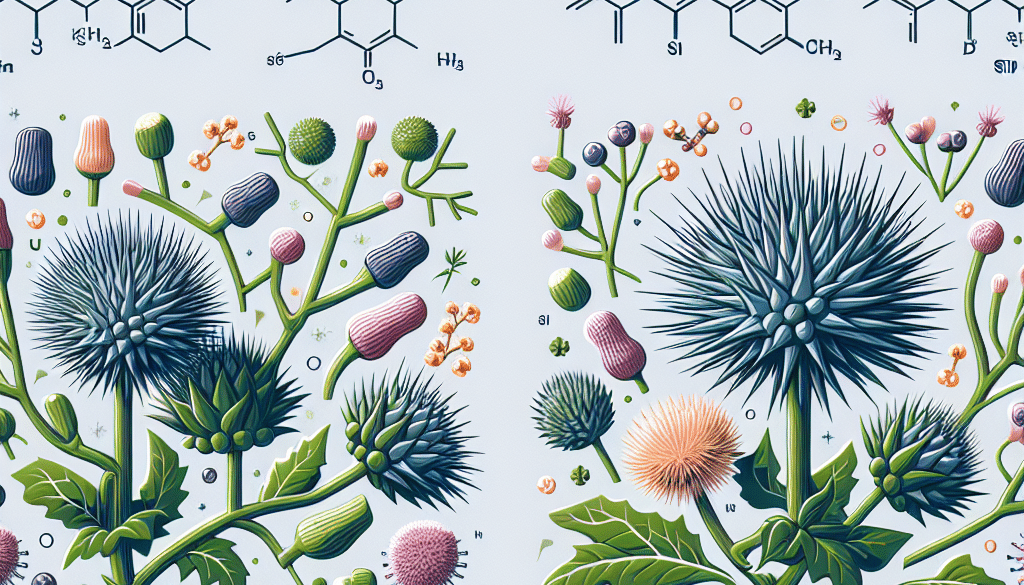What is the difference between silybin and silymarin?
-
Table of Contents
- Silybin vs. Silymarin: Understanding the Differences
- Introduction to Silymarin and Silybin
- What is Silymarin?
- What is Silybin?
- Key Differences Between Silybin and Silymarin
- Health Benefits of Silymarin and Silybin
- Scientific Research and Case Studies
- Usage in Supplements and Pharmaceuticals
- Conclusion: Silybin and Silymarin’s Roles in Health
- ETchem’s Protein Products Recommendation
Silybin vs. Silymarin: Understanding the Differences

When it comes to liver health, two terms often come up in discussions: silybin and silymarin. While they are related, they are not the same thing. This article will delve into the differences between silybin and silymarin, their benefits, and their roles in liver health and beyond.
Introduction to Silymarin and Silybin
Silymarin and silybin are both associated with the milk thistle plant, Silybum marianum, which has been used for centuries as a natural remedy for liver disorders. Understanding the distinction between these two compounds is crucial for anyone interested in natural health supplements or liver health.
What is Silymarin?
Silymarin is a complex mixture of flavonolignans extracted from the seeds of the milk thistle plant. It is commonly used in dietary supplements for its antioxidant and anti-inflammatory properties. Silymarin itself is composed of several different compounds, including silybin, isosilybin, silychristin, and silydianin, with silybin being the most active and abundant component.
What is Silybin?
Silybin, also known as silibinin, is the primary active constituent found in silymarin. It is responsible for much of the therapeutic potential attributed to milk thistle extracts. Silybin is a potent antioxidant that has been extensively studied for its ability to protect the liver from toxins and to promote liver cell regeneration.
Key Differences Between Silybin and Silymarin
While silybin is a single compound, silymarin is a group of compounds. The primary differences between them include:
- Composition: Silybin is a single molecule, whereas silymarin is a complex of related molecules.
- Concentration: Silybin is the most concentrated active ingredient in silymarin, typically comprising 50-70% of the extract.
- Activity: Silybin is considered the most bioactive component of silymarin, contributing significantly to its therapeutic effects.
Health Benefits of Silymarin and Silybin
Both silymarin and silybin have been associated with a range of health benefits, particularly concerning liver health. Here are some of the key benefits supported by research:
- Liver Protection: They protect liver cells from damage caused by toxins such as alcohol and certain drugs.
- Antioxidant Effects: Both compounds exhibit strong antioxidant properties, helping to neutralize harmful free radicals in the body.
- Anti-inflammatory Action: They have anti-inflammatory effects that can help reduce liver inflammation.
- Regeneration of Liver Cells: Silybin, in particular, has been shown to stimulate liver cell regeneration.
Scientific Research and Case Studies
Several studies have highlighted the effectiveness of silymarin and silybin in treating liver diseases. For instance, a study published in the “World Journal of Hepatology” found that silymarin significantly improved liver function in patients with alcoholic liver disease. Another study in the “Journal of Hepatology” demonstrated that silybin could reduce liver damage in patients with cirrhosis.
Usage in Supplements and Pharmaceuticals
Silymarin and silybin are widely used in dietary supplements aimed at supporting liver health. They are also being investigated for their potential in pharmaceutical applications, such as in the treatment of liver diseases and other conditions.
Conclusion: Silybin and Silymarin’s Roles in Health
In summary, silybin and silymarin are closely related but distinct compounds derived from the milk thistle plant. Silybin is the most potent component of silymarin and is largely responsible for its therapeutic effects. Both compounds offer significant benefits for liver health, acting as antioxidants and anti-inflammatory agents, and promoting liver cell regeneration.
Understanding the difference between silybin and silymarin is important for anyone considering these supplements for liver support or other health benefits. While silymarin extracts are beneficial, products standardized to contain a high percentage of silybin may offer more potent liver-protective effects.
ETchem’s Protein Products Recommendation
If you’re looking for high-quality protein products to complement your health regimen, consider ETchem’s range of collagen products. While not directly related to silybin or silymarin, collagen is another vital component of a healthy diet, supporting skin, joint, and bone health. ETchem’s protein products are manufactured with the highest quality standards, ensuring you receive the best nutritional support for your needs.
About ETChem:
ETChem, a reputable Chinese Collagen factory manufacturer and supplier, is renowned for producing, stocking, exporting, and delivering the highest quality collagens. They include marine collagen, fish collagen, bovine collagen, chicken collagen, type I collagen, type II collagen and type III collagen etc. Their offerings, characterized by a neutral taste, instant solubility attributes, cater to a diverse range of industries. They serve nutraceutical, pharmaceutical, cosmeceutical, veterinary, as well as food and beverage finished product distributors, traders, and manufacturers across Europe, USA, Canada, Australia, Thailand, Japan, Korea, Brazil, and Chile, among others.
ETChem specialization includes exporting and delivering tailor-made collagen powder and finished collagen nutritional supplements. Their extensive product range covers sectors like Food and Beverage, Sports Nutrition, Weight Management, Dietary Supplements, Health and Wellness Products, ensuring comprehensive solutions to meet all your protein needs.
As a trusted company by leading global food and beverage brands and Fortune 500 companies, ETChem reinforces China’s reputation in the global arena. For more information or to sample their products, please contact them and email karen(at)et-chem.com today.




